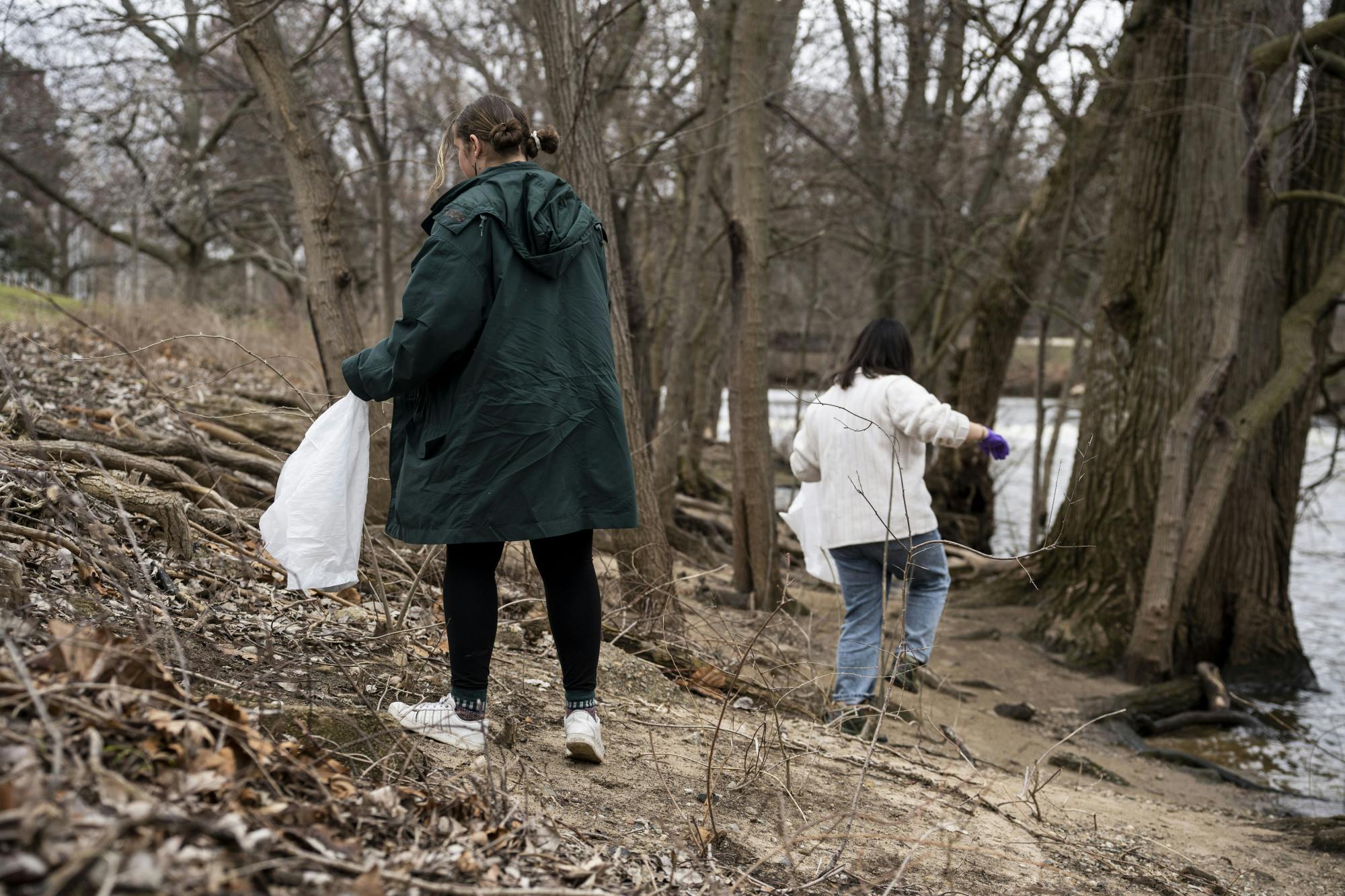On Saturday morning behind the Michigan State University library, members of the MSU Fisheries and Wildlife Club and MSU Outdoors Club gathered with trash bags and waders to delve into the Red Cedar River and clean the campus's most beloved symbol.
For supply chain management senior Brendan Wang, the Red Cedar is more than just a river, it’s a reflection of the campus.
“It flows right through the heart of campus, and I feel like it's a unique part of our identity to walk alongside the riverwalk, all the way up to even the Capitol where I’ve biked to many times,” Wang said. “It’s just really cool because I think it reflects deeply upon MSU’s roots as an agricultural college and being so closely integrated with the river.”
Once a semester, the MSU Fisheries and Wildlife Club holds the Red Cedar cleanup to remove litter that had built up in the river, clearing out anything from water bottles to street cones to protect the rich diversity of wildlife in the waters.
“We usually do a Red Cedar cleanup every semester,” fisheries and wildlife sophomore and Habitat Chair Sarah Naughtin said. “This year, (MSU) Outdoors Club wanted to work with us on it, so we did it a little earlier than Earth Day, but we wanted to come out and help the earth out a little bit together."
More than 30 types of fish can be found in the river, with green sunfish, bluegills and both largemouth and smallmouth bass call the over 51-mile-long river home. While swimming for fish in the Red Cedar watershed is not at all promoted due to the high levels of E. coli in the river, wearing waterproof waders to enter the river for cleaning can protect against the bacteria. As well, in December 2013, MSU’s Board of Trustees voted to allow hook fishing between the Brody dorms and Chestnut Road.
As Earth Day approaches, taking care of our environment we live in can make a substantial difference on every person that lives in East Lansing. As students walked past the volunteers wading into the river, some stopped to ask about what they were doing and the cause before passing along the river trail. It’s community action like the event held by the Fisheries and Wildlife and Outdoors Club that gets the student body engaged on cleaning the campus they call home.
“The thing about a lot of schools in Michigan – we don’t value water as much as we should.” Naughtin said. “This campus is built around a huge water source which is something that we kind of overlook, but our campus is built around this beautiful river that flows out into lake Michigan and has quite a few fish species … is suffering because people putting garbage in it is pretty insane.”
Retrieving from the water trash left will help protect the aquatic wildlife in the river, however, pollutants in the Red Cedar watershed will take much longer to clear. The E. coli in the river is a direct result of runoff from animal waste and agricultural runoff; cleaning the river has been an ongoing initiative in Lansing since 2002.
A management plan proposed to correct the water safety and other pollutants in the Red Cedar was approved by the U.S. Environmental Protection Agency, or EPA, in 2015. The plan, written by MSU, now has over 20 partners across Michigan to aid in the river cleanup and to protect the biodiversity of the watershed.
“It was really eye opening to see just the amount of trash – because coming here I really didn’t know what to expect but there was so much, it’s really sad.” environmental studies sophomore Emma Petersen said. “I think it’s honestly a lack of education, not really understanding your impact of what your waste does with the environment and also it’s out of convenience.”
Taking care of the environment and the place you call home is a resonating commitment to the clubs at Michigan State whose aim is to preserve the outdoors while bringing the community together.
“It’s people who put trash into the environment,” mechanical engineering freshman Allison Hopman said. “So, I think it’s our responsibility to also clean it up and take accountability for it.”
MSU Fisheries and Wildlife Club, as well as the MSU Outdoors Club, have conservation events around campus through the fall and spring semesters that are open to all volunteers who want to take part in the cleanup. Little by little, community impact and picking up waste will help keep the banks of the Red Cedar a place where students can relax and enjoy.
“It’s right in the middle of campus, so if you’re going to be on campus at all you’ve got to see the river – so everyone knows about it.” packaging junior Joe Bemis said. “It’s the landmark of the campus so it kind of defines us in a way.”
Support student media!
Please consider donating to The State News and help fund the future of journalism.
Discussion
Share and discuss “MSU Fisheries and Wildlife Club, MSU Outdoors Club clean up the banks of the Red Cedar” on social media.







